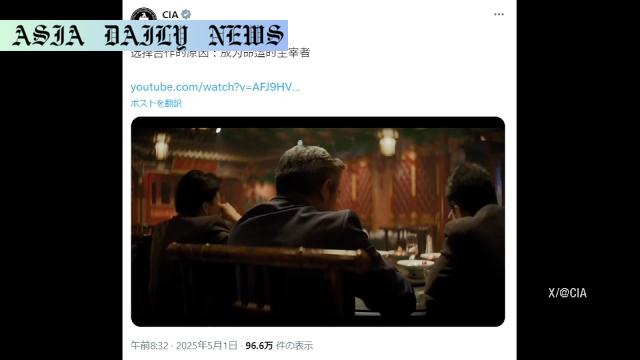CIA rolls out Chinese-language videos urging officials to leak secrets about national security, trade, and advanced technologies.
CIA released videos encouraging Chinese officials to leak secrets.
The agency aims to target CCP officials with information on national security, trade, and technology.
CIA Director emphasizes the agency’s growing focus on intelligence collection about China.

The Central Intelligence Agency (CIA) has made an unorthodox move by releasing two Chinese-language videos aimed at encouraging Chinese Communist Party (CCP) officials to leak sensitive information. This unprecedented effort marks a significant step in the United States’ ongoing intelligence operations against China, a country increasingly viewed as a strategic competitor.
The Video Campaign: A Bold Strategy
The two videos released on social media platforms on Thursday depict dramatized scenarios where CCP officials reach out to the CIA. In one video, a senior Chinese official, faced with the risk of losing his position within the party, struggles to secure his family’s future. As part of this campaign, the CIA appeals to insiders who have valuable information regarding national security policies, trade dynamics, foreign affairs, or advanced technological developments in China. These videos end with contact details for the agency, intended as a direct invitation for whistleblowers.
This major strategy aligns with an overarching shift in Washington’s intelligence priorities, with China taking center stage in its geopolitical strategy. According to statements by CIA Director John Ratcliffe, there is a renewed and amplified focus on acquiring confidential data on China. The New York Times reported that the CIA is doubling down on human intelligence assets capable of providing inside knowledge of the CCP’s inner workings, highlighting the urgent significance of this intelligence surge.
Ambitious Aims and Ethical Debates
While the videos have significantly raised global intrigue, ethical and diplomatic concerns surround this aggressive recruitment strategy. On one hand, the campaign sends a clear message about the U.S.’s priority in countering China’s influence. However, critics argue that targeting individuals within foreign governments risks exacerbating tensions between Washington and Beijing, potentially leading to retaliation or further mistrust.
The CIA’s assurance of safety to potential informants underscores its commitment to them. However, questions linger regarding how such promises hold under oppressive regimes where informants are often brutally punished if exposed. As the initiative unfolds, many are watching to see how it affects the delicate balance of U.S.-China relations.
Deeper Geopolitical Implications
This campaign should also be seen within the broader geopolitical rivalry between the U.S. and China. From technology and trade wars to national security and military dominance, the two global powers continually struggle for an upper hand. The CIA’s move is likely to escalate this rivalry, signaling that intelligence will play a decisive role in shaping the future trajectory of these nations’ relations.
Apart from seeking classified information, this initiative might serve as a test of China’s internal systems and resilience. If successful, the campaign could expose vulnerabilities within the CCP’s inner structure, offering the United States valuable insight into leadership decision-making and power struggles within the party. Such intelligence might profoundly impact U.S. policies toward China in the foreseeable future.
A calculated, bold move with potentially sweeping consequences, the CIA’s videos are a clear sign of shifting tides in modern intelligence warfare. How Beijing will respond remains to be seen, but the stakes in this high-stakes battle for information have never been higher.



Commentary
Rethinking Modern Intelligence Campaigns
The CIA’s recent efforts to recruit Chinese Communist Party officials using dramatized videos mark a turning point in public-facing intelligence tactics. This creative approach highlights not just the traditional shadowy world of espionage but also the increasingly transparent methods employed to appeal to potential informants. The choice of social media as a medium for such sensitive recruitment is revolutionary. It demonstrates the adaptability of intelligence organizations to reach specific demographics effectively.
Ethical Quandaries in Espionage
Though undeniably bold, the ethical implications of this strategy cannot be ignored. Encouraging individuals to leak information, especially those who might risk their lives for doing so, requires careful consideration. While the CIA has pledged to ensure the safety of their informants, fulfilling such promises in politically repressive contexts like China is a formidable challenge. Moreover, the public aspect of this campaign could provoke unintended consequences, such as heightening Beijing’s domestic crackdowns or fostering an arms race in counterintelligence strategies.
A Geopolitical Gamble
From a strategic perspective, the timing of these videos aligns with growing tensions between the United States and China. With trade disputes, military posturing, and technology races dominating their bilateral relationship, this recruitment push seems to be an extension of an overarching U.S. strategy to counter Chinese dominance. However, the long-term consequences of such moves remain uncertain. Will this provoke a more aggressive Chinese stance, or will it offer the U.S. critical leverage in understanding Beijing’s internal weaknesses?
Ultimately, this campaign is a fascinating case study in the evolution of modern espionage. It offers a glimpse into the high stakes and intricate chess game between two of the world’s most powerful nations.